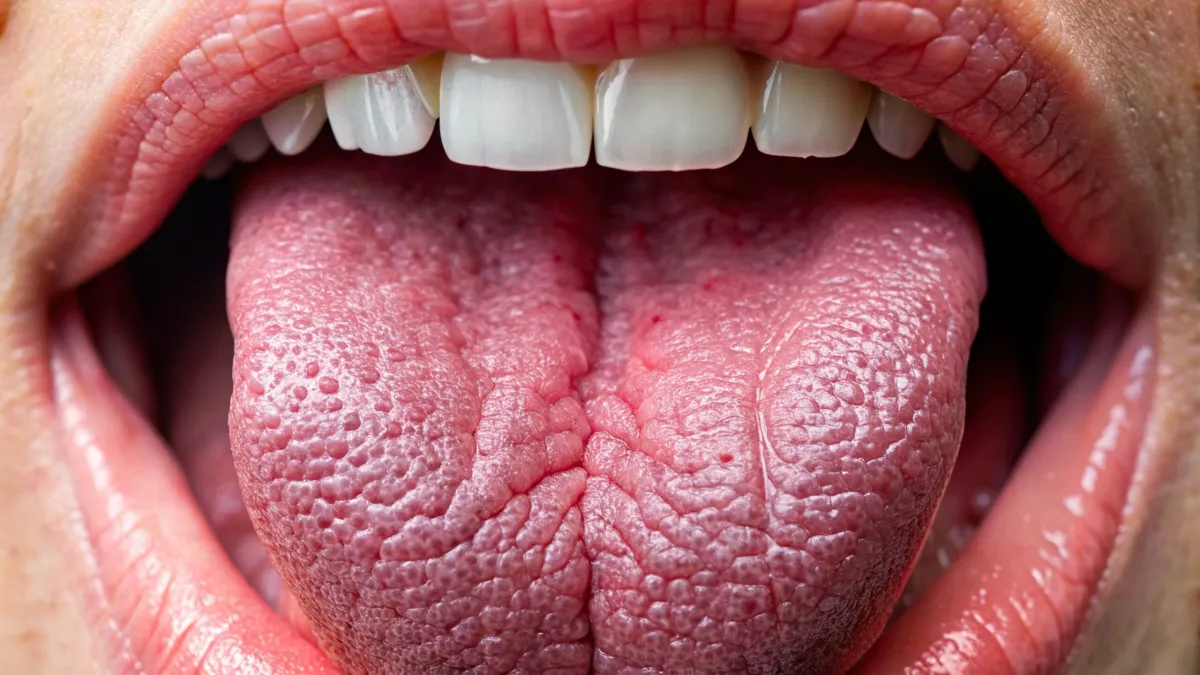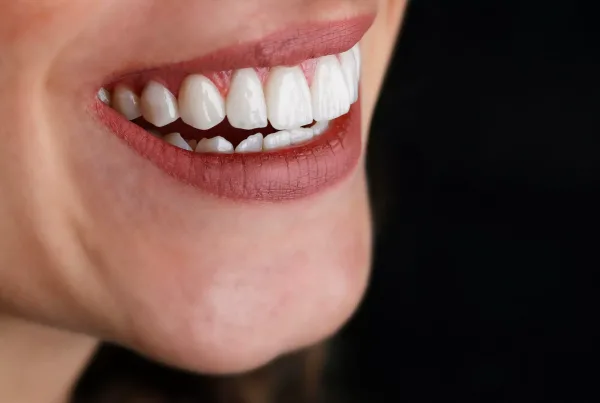
Dry mouth can have severe effects on dental health. This condition occurs when there is insufficient saliva production in the mouth. Dry mouth can pave the way for various dental diseases. Here’s what you need to know about the impact of dry mouth syndrome on dental diseases and its treatment methods:
What is Dry Mouth (Xerostomia)?
Dry mouth refers to situations where there is insufficient saliva production. Saliva is a vital fluid for oral health. It helps clean the teeth, digest food, maintain pH balance, and prevent the growth of bacteria in the mouth. However, a reduction in saliva production causes dry mouth, preventing these functions from being carried out.
Symptoms of Dry Mouth
Dry mouth occurs when the body produces less saliva than needed, manifesting in various symptoms. The symptoms of dry mouth can include:
- Feeling of Dryness in the Mouth and Throat: Dryness in the mouth and throat is one of the most common symptoms of dry mouth. This sensation may be perceived as constant thirst.
- Sticky Sensation on the Tongue: A sticky or rough feeling may develop on the tongue due to a lack of saliva.
- Difficulty Swallowing and Speaking: Dry mouth can make swallowing difficult and cause hoarseness when speaking.
- Bad Breath (Halitosis): Insufficient saliva can lead to the proliferation of bacteria in the mouth, causing bad breath.
- Chapped Lips: Dry mouth can cause lips to lose moisture and become chapped.
- Mouth Sores: Dry mouth can increase the risk of sores in the mouth. These sores can be painful and may affect eating or speaking.
- Taste Changes: Saliva plays a role in tasting food. In cases of dry mouth, the sense of taste may be affected, and food may taste different.
These symptoms may indicate dry mouth. Additionally, there may be various underlying causes of dry mouth.
What Can Cause Dry Mouth?
Dry mouth (xerostomia) can be caused by various factors. Here are some common factors that can cause dry mouth:
- Side Effects of Medications: Many prescription and over-the-counter medications can reduce saliva production. Medicines like antihistamines, antidepressants, blood pressure medications, and some pain relievers can cause dry mouth.
- Radiation and Chemotherapy: Radiation and chemotherapy used for cancer treatment can damage the salivary glands, leading to dry mouth.
- Health Conditions: Some health issues can affect saliva production, leading to dry mouth. For example, diabetes, thyroid problems, immune system disorders, and autoimmune diseases can cause dry mouth.
- Dehydration: Not drinking enough water or reducing fluid intake can decrease saliva production.
- Chronic Diseases: Certain chronic health problems, such as chronic kidney failure, liver diseases, and connective tissue diseases, can cause dry mouth.
- Tobacco Use: Smoking or using tobacco products can reduce saliva production.
- Alcohol and Caffeine Consumption: Alcohol and caffeine can cause dehydration, leading to dry mouth.
- Mouth Breathing: Breathing through the mouth due to conditions like nasal congestion, sleep apnea, or sinusitis can cause dry mouth.
Any one or a combination of these factors can contribute to the development of dry mouth in individuals.
What Dental Diseases Can Dry Mouth Cause?
Dry mouth (xerostomia) disrupts the balance of the oral environment due to insufficient saliva production, leading to various dental diseases. Here are some conditions that dry mouth can cause:
- Tooth Decay (Caries): Saliva cleans your teeth and neutralizes acids. However, with reduced saliva production due to dry mouth, your teeth lose this protection. This increases the risk of acid attacks on the teeth, leading to tooth decay (caries).
- Gum Diseases: Saliva keeps your gums moist and prevents the growth of bacteria. However, in dry mouth, the gums become drier, increasing the risk of gum diseases such as gingivitis and periodontitis.
- Mouth Sores: Dry mouth increases the risk of mouth sores, which can be painful and affect eating or speaking.
- Oral Thrush (Candidiasis): Thrush is a fungal infection in the mouth. Typically, saliva controls the growth of bacteria, but the risk of this infection increases with reduced saliva.
- Bad Breath (Halitosis): Dry mouth can cause bad breath. Insufficient saliva can lead to the proliferation of bacteria in the mouth, resulting in foul odor.
These dental diseases are more common in individuals with dry mouth and can negatively affect oral health.
How Do Dentists Diagnose Dry Mouth?
The diagnosis of dry mouth is based on symptoms and examination findings. The dentist listens to the patient’s complaints and symptoms related to dry mouth. They gather information about past medical conditions, medications taken, treatments like radiation or chemotherapy, and other potential triggers.
The dentist then carefully examines the inside of the mouth, evaluating the condition of the salivary glands. The size, shape, and flow of the salivary glands are examined. The dentist also checks for sores, decay, or other abnormalities in the mouth.
In some cases, special tests may be used to determine the amount of saliva. These tests help to directly measure the amount of saliva and determine the degree of dry mouth. The dentist may also refer to laboratory tests for saliva analysis, evaluating saliva pH levels, quantity, and the presence of certain substances.
Treatment Methods for Dry Mouth
If left untreated, dry mouth (xerostomia) can negatively affect dental health and overall quality of life. Fortunately, there are various treatment options for dry mouth. Here are some standard methods used to manage and treat dry mouth:
- Artificial Saliva Products: Artificial saliva products can alleviate dry mouth and replace saliva. They moisturize the mouth and help maintain oral health by replacing saliva.
- Medications that Stimulate Salivary Glands: Certain medications can increase saliva production from the salivary glands. Your dentist can provide information about these medications and prescribe the appropriate one.
- Oral Sprays and Moisturizers: Oral sprays and moisturizers can relieve dry mouth and moisturize the mouth. These products can be water-based or oil-based.
- Dental Treatment Methods: Your dentist may recommend various dental treatment methods to address the dental issues caused by dry mouth. These treatments may include fluoride applications, the use of sealants, and gum treatments.
- Special Oral Care Products: Specially formulated oral care products, including toothpaste, mouthwash solutions, and other items, are available for people with dry mouths.
The treatment of dry mouth varies depending on the underlying causes and is determined on a case-by-case basis. Therefore, individuals experiencing dry mouth should consult a dentist to evaluate appropriate treatment options.
What Can Be Done to Avoid Dry Mouth, and What Should Be Avoided?
Experiencing dry mouth (xerostomia) can cause both uncomfortable symptoms and negatively affect dental health. It is possible to prevent or reduce dry mouth by taking the following precautions:
What to Do:
- Increase Water Intake: Regularly drinking water is essential for hydrating the body and salivary glands. Consuming the amount of water needed according to your body mass index can increase saliva production and prevent dry mouth.
- Don’t Neglect Oral Care: Good oral hygiene habits, such as brushing your teeth regularly, using dental floss, and using mouthwash, are important. These can reduce the risk of tooth decay and other oral problems.
- Eat Fresh Fruits and Vegetables: Consuming fiber-rich and water-rich fruits and vegetables can increase saliva production.
- Stay in Humid Environments: Dry environments can increase dry mouth. Spending more time in humid environments or using humidifiers can help reduce dry mouth.
What to Avoid:
- Limit Alcohol and Caffeine Consumption: Beverages containing alcohol and caffeine can dehydrate the body and increase dry mouth. Therefore, it is important to limit alcohol and caffeine consumption.
- Avoid Tobacco Use: Smoking or using tobacco products can reduce saliva production and increase dry mouth.
- Avoid Excessively Spicy and Salty Foods: Excessively spicy and salty foods can irritate the mouth and reduce saliva production.
- Avoid Mouth Breathing: Even in cases of nasal congestion, it is essential to avoid mouth breathing. It can dry out the mouth and increase dryness.
By following these suggestions, you can have a more comfortable oral health experience and prevent or reduce dry mouth.
Dry Mouth During Pregnancy
Although pregnancy is an exciting process for many women, it can cause a series of changes in the body. One of these changes may be dry mouth. Here’s what you need to know about dry mouth during pregnancy:
- Hormonal Changes: Increased hormone levels in the body during pregnancy can affect the functioning of the salivary glands and cause dry mouth.
- Risk of Dehydration: During pregnancy, the body requires more water, increasing the risk of dehydration.
- Morning Sickness: Some women experience morning sickness during pregnancy, which can reduce saliva production.
- Calcium Supplements: Doctors recommend calcium supplements during pregnancy. However, some calcium supplements can cause dry mouth.
- Other Pregnancy Symptoms: During pregnancy, some women experience frequent urination, heartburn, or nausea. These symptoms can increase the risk of dehydration and cause dry mouth.
Dry mouth is a common condition during pregnancy and is usually harmless. However, if dry mouth is severe or accompanied by other bothersome symptoms, it is recommended to consult a dentist.





